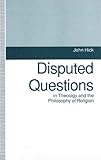Disputed questions in theology and the philosophy of religion / John Hick.
Material type: TextPublication details: New Haven : Yale University Press, 1993.Description: xi, 198 p. ; 22 cmISBN:
TextPublication details: New Haven : Yale University Press, 1993.Description: xi, 198 p. ; 22 cmISBN: - 0300053541
- 9780300053548
- 0333565274 (MACMILLAN)
- 9780333565278 (MACMILLAN)
- 0300065051
- 9780300065053
- ARCH YNDC 200 H627D
- BL51 .H488 1993
| Item type | Current library | Collection | Call number | Status | Date due | Barcode | |
|---|---|---|---|---|---|---|---|
 Archives
Archives
|
SAIACS Archives Room | Yandell Collection | ARCH YNDC 200 H627D (Browse shelf(Opens below)) | Not for loan | 064353 |
Includes bibliographical references and index.
Pt. I. Epistemological. 1. Religious Realism and Non-realism. 2. Religious Experience: Its Nature and Validity -- Pt. II. Christ and Christianity. 3. An Inspiration Christology. 4. The Logic of God Incarnate. 5. The Non-absoluteness of Christianity -- Pt. III. Hints from Buddhism. 6. The Buddha's Doctrine of the 'Undetermined Questions'. 7. Religion as 'Skilful Means' -- Pt. IV. Religious Pluralism. 8. A Personal Note. 9. Jews, Christians, Muslims: Do We All Worship the Same God? 10. The Real and its Personae and Impersonae -- Pt. V. Life and Death. 11. A Possible Conception of Life after Death.
When medieval theologians wrote their Quaestiones Disputatae, the disputed questions concerned relatively peripheral topics, for most Christians agreed on all of the most basic matters. But today even the most central issues in Christianity are controversial, and Christian discourse itself is part of the wider dialogue that includes all the great religious and philosophical traditions of the world.
In this book a leading philosopher of religion offers fresh insights into some of the disputed religious questions of our time.
John Hick begins by addressing the most fundamental questions: whether religion is a wish-fulfilling projection or a human response to the Transcendent, and whether religious experiences constitute authentic awareness of a divine Reality.
He then considers specifically Christian beliefs, such as the deity of Jesus and the problems encountered by attributing to Jesus both all divine and all human properties, and he suggests an alterative image of Jesus as a man extraordinarily open to and inspired by the divine spirit. Hick gives a personal account of how he has come to accept religious pluralism - that the major world faiths are different but equally valid responses to ultimate Reality. He considers how much Christians have to learn from Buddhism, discusses the ongoing dialogue among Jews, Christians, and Muslims, and outlines a philosophy of religions - a conception of the relationship between world religions and between them and the ultimately Real.
Finally he turns to the mystery of death and, using the resources of the world religions and of parapsychology, suggests a possible conception of life after death.
There are no comments on this title.

